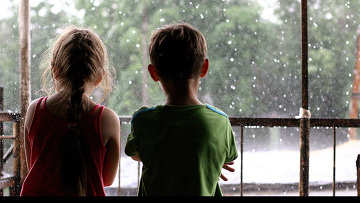Sensitivity key to ministering to “invisibly challenged” children

Photo: RIA Novosti
More and more children, for one reason or another, are being diagnosed with brain disorders, such as ADHD, autism, depression, or bipolar disorder. Unlike cerebral palsy or Down syndrome, these physical challenges are only visible through their symptoms, usually manifested in a child’s behavior. It is easy to stand by and think or say, “If only that parent would get better control of his kid,” or “what that kid needs is a good spanking,” or “what a bratty kid!” And while some pop psychologists with newspaper columns and talk shows just might agree, such reactions have little to do with the very real diagnoses many children and their parents face every day.
“Invisible disorders” are genetic. They are recognized within the medical community by commitment to treatment and research. Parents don’t want their child to have a brain disorder, any more than they want him or her to have any other disease. Unfortunately, the symptoms of these disorders often appear to be willful or condoned behavior. Rather than helping families of children with these disorders, we too often exclude them from our communities by being judgmental of the parent and/or child. These families need spiritual support to face the overwhelming challenges that these disorders bring to their households.
Children with mood disorders can rage for hours, making it difficult to calm them down. They can be physically aggressive, as well as verbally abusive. It’s not always a question of parenting. A brain disorder can be compared to a stomach ache; while the parent is hardly responsible for the condition, he or she is incapable of preventing a sick child from vomiting.
Parents are usually busy shuttling the child from one appointment or activity to another. School can be an issue, especially if a child is not stable enough to stay in a regular classroom. Such children may find it hard to make and keep friends. Neighbors tend to become less than “neighborly,” and they may even treat the family as if they have leprosy.
How can we help such parents and children? The first step is to maintain an attitude of love, compassion, and acceptance for the family. The stigma of having a child diagnosed with one of these disorders can be so overwhelming that some parents do not disclose their child’s diagnosis, even to close friends. If they do disclose this to you, honor their trust by keeping it to yourself – unless you have their permission to share.
Offer to help in some way, even if you are turned down. Just the act of offering help shows that you are supportive.
Help with the children. If there is more than one child in the affected family, be a mentor or “big brother/big sister” to the affected child’s siblings. When one child in the family is ill, the norm for family dynamics is to focus more on the child who is ill. Extra attention is usually helpful for the other siblings. Volunteer to take them for a while so their parents can go out for a cup of coffee – alone.
Help out at church. It can be very stressful for parents who are trying to help their child “keep it together” during church. Disapproving glances or rude comments only add to the stress. While it is understandable that some order must be maintained during liturgy, it is unfair to place the burden entirely on the parents of a special needs child – and doing so could cause the family to leave the service, and eventually the parish and/or Church, altogether. Approach the parent during a non-liturgical moment, perhaps before a service begins, and offer to help with his or her child.
Children with behavior issues need to be involved with other children at church as much as possible in order to observe and learn appropriate behavior. If a child is in Church school, the teachers should be made aware of his or her situation and offered suggestions for dealing with him or her without highlighting any disabilities. Children can and do learn even when they are not perfectly still. It is also crucial to focus on a child’s positive, rather than negative, behaviors. Sometimes the most important thing to realize is that they are in church. Just getting them there can be quite an accomplishment. If a child is hospitalized for emotional or related disorder, offer the family the same support that would be forthcoming if, for instance, a child was hospitalized with a heart problem. Offer to make a meal for the family or to take other siblings on an outing. Parents often are exhausted from dealing with the day-to-day issues a special needs child can present; coping with a hospitalized child is infinitely more trying. Giving such parents “a break” can be a welcome contribution.
Wendy Cwiklinski and her husband, Chaplain Jerome Cwiklinski, are the parents of five children, four of whom have been diagnosed with mood disorders and/or autism. She works with parents with children with brain disorders. She holds a diploma in religious education from St. Vladimir’s Seminary and is an MA candidate at Fordham University.
















